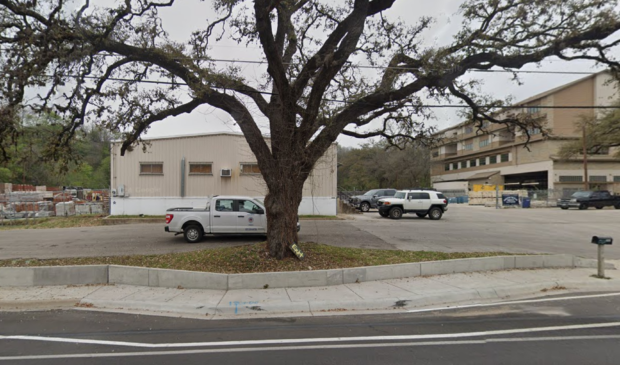Following court ruling, Oak Springs project scrambles to get back on track
Wednesday, June 5, 2024 by
Elizabeth Pagano Planning Commission members unanimously recommended an Oak Springs Road zoning change that was temporarily thwarted by a court ruling – despite concerns at their most recent meeting about an abbreviated timeline from a neighborhood representative.
In May 2023, developers submitted a site plan that was approved through the now-obsolete Vertical Mixed Use 2 ordinance process, using the existing zoning on the site. Since then, a court ruling invalidated the development plan, so the project is now going through a public process in order to develop that same site plan under DB90 – a tool that has replaced VMU2 as a way to build more density now that it is no longer available.
When complete, the proposed 75-foot-tall building at 2900 Oak Springs Road will have 240 multifamily units, 29 of which will be affordable at 60 percent of the median family income (MFI) or less.
Though the site plan was submitted more than a year ago, Homewood Heights Neighborhood Association President Chris Page requested a postponement, saying the neighborhood had received scant notice on the new strategy. That request resonated with some commissioners, who argued that a two-week delay would not impact the case from moving on for consideration at City Council on the planned date of July 18, so there was no real harm in a postponement. But others argued that the process had become so convoluted for the applicant due to the court’s ruling that it was only right for it to move forward as soon as possible.
“This was a plan that was moving forward under a different set of rules. Those rules were taken away, so we’re bringing it back in the most efficient way we can,” Commissioner Felicity Maxwell said. “We’re now saying that we have to give more time to something that has already been through administrative approval (and) would have already been in process had those rules not changed.
“While I do understand that there is a concern of hearing (from the) community, and that there have been changes, those are not necessarily relevant to this particular project,” she continued. “We know staff has reviewed this project and feels comfortable with it moving forward.”
Ron Thrower, who was representing the applicant with his firm Thrower Design, explained that the project had been “on life support” after the court ruling, but DB90 “had brought the breath of life into the project.”
“The developer went into immediate mode, hired us, we filed a case and here we are today with it,” said Thrower, who explained that they were moving as fast as they could to move the project forward before the site plan expired in August.
For his part, Page cited “commissioners’ apparent resentment toward a string of judicial interventions in illegal procedure” for breaking the Planning Commission’s normal rules of procedure, which dictate the commission “may deny a first request for postponement under extraordinary circumstances.”
“You’ve openly stated that there’s none,” he said. “City Council is going to hear it on the same day no matter what.”
Page said that the rezoning application was filed just about a month ago, with notification to the neighbors received about two weeks ago. The short time frame, he said, prevented the neighborhood from having a meeting about the plan and amounted to a denial of process.
Thrower said that the neighborhood had, in fact, had access to the site plan since it was filed a year ago and they were trying to move the case forward before it expired in August.
“That’s all we’re trying to obtain tonight with this rezoning … to get that site plan approved that they’ve been looking at for a year,” he said.
In terms of the zoning, Page argued that the affordable housing at 60 percent MFI would actually aid in gentrifying the neighborhood, as the census tract the property is on currently has an average household income that is just above $54,000. The new figures for 2024, which are calculated for the whole city, put 60 percent MFI for a family of four at $75,600.
He also asked that an environmental review be conducted to ascertain the integrity of the slope behind the project and identify springs on the property.
“We have springs there that we don’t give a damn about, even though we treat other springs in the city like it’s a religious site,” Page said. “Frankly, I understand the need for that, but can’t we get that equally? Or can’t we at least get enough consideration to not destroy the homes that are already there?”
Page also objected to an initial plan to remove ground-floor commercial space, but Thrower explained that they were no longer asking for that waiver.
In the end, commissioners unanimously voted in favor of the project, despite scattered misgivings about the choice not to postpone the case.
Commissioner Greg Anderson did not share that hesitation.
“This is a case where I would hope that this body never grants a postponement where we are being asked to move DB90,” Anderson said. “This isn’t a unique case. This is going to be every case for me. And if this body moves forward with that, that’d be a great precedent of just making it easier to build homes in the city.”
The Austin Monitor’s work is made possible by donations from the community. Though our reporting covers donors from time to time, we are careful to keep business and editorial efforts separate while maintaining transparency. A complete list of donors is available here, and our code of ethics is explained here.
You're a community leader
And we’re honored you look to us for serious, in-depth news. You know a strong community needs local and dedicated watchdog reporting. We’re here for you and that won’t change. Now will you take the powerful next step and support our nonprofit news organization?








